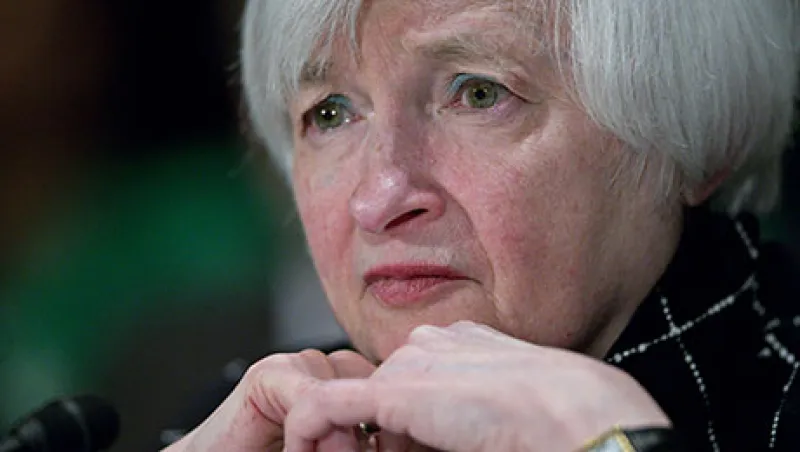Markets anxiously await an announcement by the Federal Reserve this afternoon that broad consensus suggests will produce no interest-rate hike. The suspense, however, is in what the Federal Open Market Committee will say about the future. The dollar rose against most primary currencies on expectations that the committee will assume a mildly hawkish tone. While many economists anticipate another hike in June as employment data continues to exhibit strength, concerns over volatility around the globe and fragility in some sectors, notably energy and industrials, suggest that the Fed may signal a moderation of the pace of tightening; futures markets for federal-funds rates are now pricing in only two increases for 2016. A slower path for rates seems plausible as core inflation appears to be manageable and regional Fed stress indices have receded to more relaxed levels in the past month.
Deutsche Borse and LSE to merge. On Wednesday, the London Stock Exchange Group and Deutsche Borse announced an all-stock merger that will create the largest European securities market with a combined market capitalization exceeding $30 billion. The two exchanges, which publicly acknowledged that talks were under way in February, anticipate savings of $500 million annually through synergies. The transaction will result in a new entity in which LSE shareholders will hold a 45.6 percent stake. The Deutsche Borse traces its roots to the Frankfurt Exchange in the 16th century while the LSE grew from stockbrokers gathering at Jonathan’s Coffee House in London in the late 17th century.
Jefferies, Morgan Stanley trading results paint grim picture. Early signals are bearish in advance of first-quarter earnings announcements by major Wall Street banks. On Tuesday, Jefferies Group, a subsidiary of Leucadia National Corp., announced results for the fiscal quarter ending February 29. Although mark-to-market declines in key equity positions were the primary drivers of the earnings shortfall, trading and advisory revenues fell by nearly half of those in the same quarter of 2015. The pain extended across both equity and fixed-income trading, traditionally the firms strongest divisions. Separately, Morgan Stanley guided expectations for revenues in the first quarter to come in flat from the last three months of 2015, disappointing analysts looking for a rebound. European banks appear poised to perform even worse with Deutsche Bank co-CEO John Cryan saying the German bank is unlikely to return to profitability in 2016.
OPEC announces meeting with non-members. On Tuesday Qatari Energy Minister Mohammed Bin Saleh Al-Sada announced that members of the Organization of Petroleum Exporting Countries would meet with major producers that are not members of the group in Doha on April 17 to discuss potential production cuts. The announcement follows comments by Russian Energy Minister Alexander Novak that Iran is likely to be exempted from any limits until it achieves higher output levels following the lifting of sanctions. Brent grade futures contracts for front-month delivery rose in trading in London on the new to levels above $39 per barrel.
Primaries provide victories for Clinton, Trump as Rubio drops out. Hillary Clinton won all four Democratic primaries held on Tuesday, including hotly contested races in Ohio and Illinois. Donald Trump emerged victorious in three of the four Republican primaries, including the winner-take-all state of Florida, which provides the real estate developer with 99 delegates. After losing his home state, Florida Senator Marco Rubio announced that he has suspended his presidential campaign. Critically, Ohio Governor John Kasich prevailed in his state against Trump, another winner-take-all primary, potentially setting the stage for a contested GOP convention in Cleveland in June.
Lula considers return to national office. Following criminal charges filed against him as part of the ongoing Petrobras corruption scandal, former Brazilian President Luiz Inacio Lula da Silva announced that he is considering accepting a cabinet position in a return to politics that would represent a defense through offense by the embattled current administration of President Dilma Rouseff. Millions of Brazilians took to the streets in cities across the nation calling for the impeachment of Rousseff, who succeeded Lula. If Lula accepts the position, he will receive immunity from prosecution, sparking concern about political crises that could see further cuts in Brazil’s sovereign credit rating.
Portfolio Perspective: Long-Term Oil Fundamentals Remain Bullish but the Rebound May Not Last
In our view, the case for the longer-term recovery for crude remains intact given production declines, all-time lows in rig count, growing bankruptcies, etc. That being said, this recent rally feels a lot like the head fake we saw this time last year. Last week the speculative activity in oil saw its biggest ever two-month increase from December lows and, over the last week, it has bounced even higher. Speculative positioning in Brent is at its highest level since May of last year, and has only been higher than it is now 9 percent of the time over the last five years. In the last week, the RSI for Brent crude also reached overbought levels, rising above 70 for the first time since June 2014.
The IEA sees oil prices bottoming as demand stabilizes and supply declines, amid reports that sell-side brokers are capitulating on bearish views, and that Venezuela will be tendering for U.S. crude exports, all suggesting that the market is starting to turn (both fundamentally and psychologically). In addition, natural gas has stopped making new lows, while demand for gas from power generation has seen significant increases on a weather-adjusted basis and production is starting to decline. Looking forward, the supply/demand imbalance may quickly tighten as weather normalizes and supply falls. Also, note that pipelines continue to be delayed (a couple of examples include the Rover, Atlantic Sunrise and Constitution pipeline projects).
Ted Harper is a fund manager and senior research analyst for energy and commodities with Frost Investment Advisors in San Antonio, Texas.






